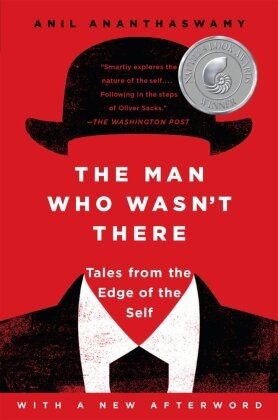Condividi
Fr. 35.40
Anil Ananthaswamy, Anil (Anil Ananthaswamy) Ananthaswamy
The Man Who Wasn't There - Tales from the Edge of the Self
Inglese · Tascabile
CONSIGLIO
Spedizione di solito entro 2 a 3 settimane (il titolo viene stampato sull'ordine)
Descrizione
Zusatztext 79902072 Informationen zum Autor ANIL ANANTHASWAMY is former deputy news editor and current consultant for New Scientist . He is a guest editor at UC Santa Cruz’s renowned science-writing program and teaches an annual science journalism workshop at the National Centre for Biological Sciences in Bangalore, India. He is a freelance feature editor for the Proceedings of the National Academy of Science’s “Front Matter” and has written for National Geographic News, Discover , and Matter . He has been a columnist for PBS NOVA’s The Nature of Reality blog. He won the UK Institute of Physics’ Physics Journalism award and the British Association of Science Writers’ award for Best Investigative Journalism. His first book, The Edge of Physics , was voted book of the year in 2010 by Physics World . He lives in Bangalore, India, and Berkeley, California. Klappentext In the tradition of Oliver Sacks, science journalist Anil Ananthaswamy skillfully inspects the bewildering connections among brain, body, mind, self, and society by examining a range of neuropsychological ailments from autism and Alzheimer's to out-of-body experiences and body integrity identity disorder Award-winning science writer Anil Ananthaswamy smartly explores the concept of self by way of several mental conditions that eat away at patients' identities, showing we learn a lot about being human from people with a fragmented or altered sense of self. Ananthaswamy travelled the world to meet those who suffer from "maladies of the self" interviewing patients, psychiatrists, philosophers and neuroscientists along the way. He charts how the self is affected by Asperger's, autism, Alzheimer's, epilepsy, schizophrenia, among many other mental conditions, revealing how the brain constructs our sense of self. Each chapter is anchored with stories of people who experience themselves differently from the norm. Readers meet individuals in various stages of Alzheimer's disease where the loss of memory and cognition results in the loss of some aspects of the self. We meet a woman who recalls the feeling of her first major encounter with schizophrenia which she describes as an outside force controlling her. Ananthaswamy also looks at several less familiar conditions, such as Cotard's syndrome, in which patients believe they are dead, and those with body integrity identity disorder, where the patient seeks to have a body part amputated because it "doesn't belong to them." Moving nimbly back and forth from the individual stories to scientific analysis The Man Who Wasn't There is a wholly original exploration of the human self which raises fascinating questions about the mind-body connection. An allegory about a man who was devoured by ogres first appears in an ancient Indian Buddhist text of the Madhyamika (the middle-way) tradition. It dates from sometime between 150 and 250 CE and is a somewhat gruesome illustration of the Buddhist notion of the true nature of the self. A man on a long journey to a distant land finds a deserted house and decides to rest for the night. At midnight, an ogre turns up carrying a corpse. He sets the corpse down next to the man. Soon, another ogre in pursuit of the first arrives at the deserted house. The two ogres begin bickering over the corpse. Each claims to have brought the dead man to the house and wants ownership of it. Unable to resolve their dispute, they turn to the man who saw them come in, and ask him to adjudicate. They want an answer. Who brought the corpse to the house? The man, realizing the futility of lying to the ogres—for if one won’t kill him, the other one will—tells the truth: the first ogre came with the corpse, he says. The angry second ogre retaliates by ripping off the man’s arm. What ensues gives the allegory its macabre twist. The first ogre immediately detaches an arm from the corpse and attache...
Dettagli sul prodotto
| Autori | Anil Ananthaswamy, Anil (Anil Ananthaswamy) Ananthaswamy |
| Editore | Dutton Books |
| Lingue | Inglese |
| Formato | Tascabile |
| Pubblicazione | 31.08.2016 |
| EAN | 9781101984321 |
| ISBN | 978-1-101-98432-1 |
| Pagine | 308 |
| Dimensioni | 135 mm x 203 mm x 17 mm |
| Serie |
Dutton |
| Categorie |
Guide e manuali
> Salute
Scienze umane, arte, musica > Psicologia > Psicologia teorica |
Recensioni dei clienti
Per questo articolo non c'è ancora nessuna recensione. Scrivi la prima recensione e aiuta gli altri utenti a scegliere.
Scrivi una recensione
Top o flop? Scrivi la tua recensione.

